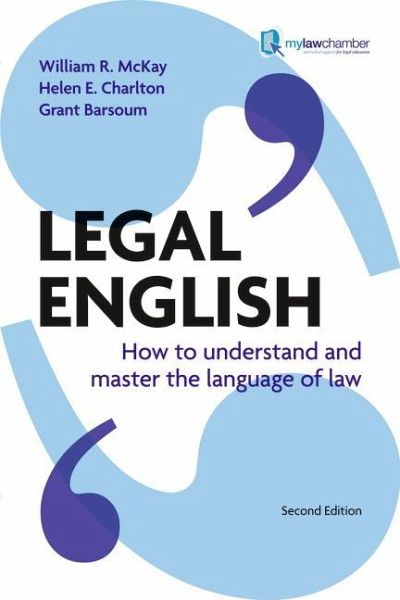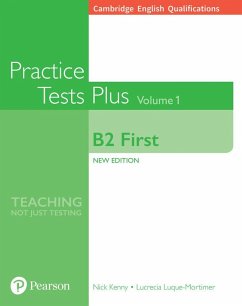
Legal English
How to Understand and Master the Language of Law

PAYBACK Punkte
39 °P sammeln!
Legal English: How to Understand and Master the Language of Law offers a contemporary guide for students and practitioners alike who want to improve their language skills and build confidence in communicating effectively from the classroom to the courtroom.
The second edition has been completely revised and updated to cover all aspects of language as used in a legal context where effective communication is crucial to both academic and professional success.
Product Description
Legal English: How to Understand and Master the Language of Law offers a contemporary guide for students and practitioners alike who want to improve their language skills and build confidence in communicating effectively from the classroom to the courtroom.
The second edition has been completely revised and updated to cover all aspects of language as used in a legal context where effective communication is crucial to both academic and professional success.
Features + Benefits
Legal English provides a wealth of advice, examples, and practical exercises so readers have the tools to:
strengthen written and oral communication skills
learn proper referencing and citation for academic legal writing
understand and use legal terminology correctly
become familiar with language conventions in legal documents
distinguish between the types of language appropriate to various settings
develop vocabulary and technique for interviewing and advising, negotiation, and advocacy
The text is also supported by mylawchamber which offers additional resources for practising legal language skills including audio exercises for interviewing and negotiation.
Backcover
Legal English offers a contemporary guide for students and practitioners alike who want to improve their language skills and build confidence in communicating effectively, from the classroom to the courtroom.
The second edition has been completely revised and updated to cover all aspects of language as used in a legal context where effective communication is crucial to both academic and professional success. It provides a wealth of advice, examples and practical exercises so you have the tools to:
strengthen your written and oral communication skills
learn proper referencing and citation rules for academic legal writing
understand and use legal terminology correctly
become familiar with language conventions in legal documents
distinguish between the types of language appropriate to various settings
develop vocabulary and technique for interviewing and advising, negotiation, and advocacy.
The text is supported by mylawchamber which offers additional resources for practising legal language skills including audio exercises for interviewing and negotiation.
Legal English will prepare you to engage confidently with the language of law in a world where every word counts and will ensure that you are poised for success.
'This is a much needed text and should be on the reading list of all students who need to get to grips with language issues.' Dr Sharon Hanson (PhD), Senior Lecturer in Law, Department of Law and Criminal Justice Studies, Canterbury Christ Church University
'I would recommend this book to students who intend to study law and need to learn legal language.' Alison Chisholm, Sussex Centre for Language Studies, Sussex University
About the authors
William R. McKay is a qualified solicitor and Senior Lecturer on the Legal Practice Course at London Metropolitan University. He teaches Business Law and Practice, Intellectual Property, Employment Law, and Mediation. He has also taught civil litigation, civil advocacy, opinion writing, drafting, and employment law on the Bar Vocational Course.
Helen E. Charlton (LL B and MA TEFL) has taught English as a foreign language for several leading language schools. She teaches Business English to clients from major corporations and has worked in Japan.
Grant Barsoum is a Senior Lecturer in Academic English and Academic Skills at London Metropolitan University. In addition to his extensive experience in teaching English in the UK, Egypt and France, he has worked for over ten years as a translator and interpreter for the legal profession. For the last ten years he has been teaching at universities with particular interest in English and Academic Skills for law students.
Acknowledgements
Preface to the second edition
Chapter 1: Academic writing
Chapter 2: Reading law at university
Chapter 3: Writing letters, e-mails and internal documents
Chapter 4: Drafting legal documents for business
Chapter 5: Drafting for court
Chapter 6: Oral presentation skills
Chapter 7: Interviewing and advising
Chapter 8: Negotiation
Chapter 9: Advocacy
Appendix: Legal study and research guide
Glossary
Suggested answers to exercises
The second edition has been completely revised and updated to cover all aspects of language as used in a legal context where effective communication is crucial to both academic and professional success.
Product Description
Legal English: How to Understand and Master the Language of Law offers a contemporary guide for students and practitioners alike who want to improve their language skills and build confidence in communicating effectively from the classroom to the courtroom.
The second edition has been completely revised and updated to cover all aspects of language as used in a legal context where effective communication is crucial to both academic and professional success.
Features + Benefits
Legal English provides a wealth of advice, examples, and practical exercises so readers have the tools to:
strengthen written and oral communication skills
learn proper referencing and citation for academic legal writing
understand and use legal terminology correctly
become familiar with language conventions in legal documents
distinguish between the types of language appropriate to various settings
develop vocabulary and technique for interviewing and advising, negotiation, and advocacy
The text is also supported by mylawchamber which offers additional resources for practising legal language skills including audio exercises for interviewing and negotiation.
Backcover
Legal English offers a contemporary guide for students and practitioners alike who want to improve their language skills and build confidence in communicating effectively, from the classroom to the courtroom.
The second edition has been completely revised and updated to cover all aspects of language as used in a legal context where effective communication is crucial to both academic and professional success. It provides a wealth of advice, examples and practical exercises so you have the tools to:
strengthen your written and oral communication skills
learn proper referencing and citation rules for academic legal writing
understand and use legal terminology correctly
become familiar with language conventions in legal documents
distinguish between the types of language appropriate to various settings
develop vocabulary and technique for interviewing and advising, negotiation, and advocacy.
The text is supported by mylawchamber which offers additional resources for practising legal language skills including audio exercises for interviewing and negotiation.
Legal English will prepare you to engage confidently with the language of law in a world where every word counts and will ensure that you are poised for success.
'This is a much needed text and should be on the reading list of all students who need to get to grips with language issues.' Dr Sharon Hanson (PhD), Senior Lecturer in Law, Department of Law and Criminal Justice Studies, Canterbury Christ Church University
'I would recommend this book to students who intend to study law and need to learn legal language.' Alison Chisholm, Sussex Centre for Language Studies, Sussex University
About the authors
William R. McKay is a qualified solicitor and Senior Lecturer on the Legal Practice Course at London Metropolitan University. He teaches Business Law and Practice, Intellectual Property, Employment Law, and Mediation. He has also taught civil litigation, civil advocacy, opinion writing, drafting, and employment law on the Bar Vocational Course.
Helen E. Charlton (LL B and MA TEFL) has taught English as a foreign language for several leading language schools. She teaches Business English to clients from major corporations and has worked in Japan.
Grant Barsoum is a Senior Lecturer in Academic English and Academic Skills at London Metropolitan University. In addition to his extensive experience in teaching English in the UK, Egypt and France, he has worked for over ten years as a translator and interpreter for the legal profession. For the last ten years he has been teaching at universities with particular interest in English and Academic Skills for law students.
Acknowledgements
Preface to the second edition
Chapter 1: Academic writing
Chapter 2: Reading law at university
Chapter 3: Writing letters, e-mails and internal documents
Chapter 4: Drafting legal documents for business
Chapter 5: Drafting for court
Chapter 6: Oral presentation skills
Chapter 7: Interviewing and advising
Chapter 8: Negotiation
Chapter 9: Advocacy
Appendix: Legal study and research guide
Glossary
Suggested answers to exercises
Rev ed. of: Legal English / William R. McKay, Helen E. Charlton. 2005.
Dieser Artikel kann nur an eine deutsche Lieferadresse ausgeliefert werden.












